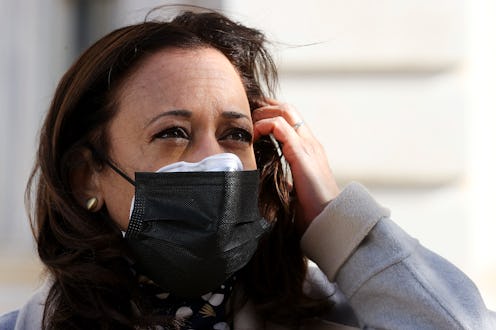Health
The CDC Revealed Exactly How Effective Double Masking Is
Multilayer is the new black.

Masks are a part of daily life nowadays: you're doubtless an expert on elegantly slinging one on mid-stride. Now, Dr. Anthony Fauci M.D, the director of the National Institute of Allergy & Infectious Diseases and the nation's top infectious disease expert, has told NBC News that double masking — wearing two masks instead of one — "just makes common sense." Why? With new, more infectious variants of COVID spreading, doubling up reduces your chances of spreading COVID particles.
"Some of the new SARS-CoV2 variants appear to be more infectious and easier to transmit," Dr. Bob Bollinger M.D. M.P.H., a professor of infectious diseases at Johns Hopkins University and founding member of emocha health, tells Bustle. "It makes sense that more effective masking might help."
You may have spotted everybody from Dr. Jill Biden to inaugural poet Amanda Gorman double-masking in recent weeks, but here's the lowdown on why you might want to do it too.
What's The Data On Double Masking?
Double masking is gaining traction as an idea to reduce COVID transmission. "Experimental data show that for lower quality masks, double masking may improve performance," Dr. John A. Sellick D.O., professor of medicine at the University of Buffalo's Jacobs School Of Medicine & Biomedical Sciences, tells Bustle. "If you have a single or double-layered cloth mask, then double masking may provide better protection than just one mask."
The Centers for Disease Control & Protection (CDC) released data on Feb. 10 showing that tightly fitting masks or wearing a cloth mask over a surgical mask could reduce exposure to COVID particles by a cool 95%. The CDC's report also suggested adding mask filters or wearing a nylon covering over a mask to improve a mask's fit. The key, the report notes, is to make sure your mask fits snugly over your nose and mouth, without gaps on the side that let air pass through.
The basic principle is this: A mask makes it difficult for particles to pass through, and the more layers it has, the more particles will be trapped inside. Studies of masks and respirators in 2020 found that multi-layered masks tended to be the most effective at preventing droplets of COVID or other respiratory viruses from spreading. A study published in November, in preprint on medRxiv, that found that a three-layer cloth mask, with outer fabric layers and an inner layer of filtration, was the most effective option.
How To Double-Mask
"A triple-layered cloth mask with a middle filter layer that fits correctly should be sufficient to protect against the transmission of the novel coronavirus," Dr. Sellick says. No triple-layered mask around? Dr. Sellick notes that if you wear a paper surgical mask with gaps on either side of the face, a second, well-fitting cloth mask on top may improve protection. The key here is well-fitting; if you can adjust your cloth mask so that it's snug over your nose and mouth, do. Dr. Sten Vermund M.D. Ph.D., dean of the Yale School of Public Health, told Yahoo! News in December that second masks are a particularly good idea for people who work in public-facing roles.
There's no need to keep piling masks on, however. Dr. Linsey Marr, PhD, a virus transmission expert at Virginia Tech and author of that November preprint, told The New York Times in January that if you layer more than two masks, you may find it more difficult to breathe.
If you're wearing a fitted N95 mask, or N95-like mask such as a KN95, there's no need to double up. Dr. Sellick says that N95s with valves or respirators on the side shouldn't be doubled up, or indeed used at all. "They do not prevent the spread of the virus in the event you are infected and therefore are not acceptable for use."
Does Double-Masking Mean You Can Stop Social Distancing?
Double masking, or wearing triple-layered single masks, will protect those around you if you keep physical distancing, social distancing, avoiding crowds and congregations, and avoiding unnecessary travel, Dr. Janette Nesheiwat M.D., an emergency physician, says. This is because even double-masking won't fully stop you from spreading the illness; there's still a chance some viral particles might get through.
You'll still need to mask, single or double, once you get vaccinated. "It is possible for you to be a carrier of the COVID-19 virus, even after you have been vaccinated," Dr. Seema Sarin M.D., head of lifestyle medicine at EHE Health, tells Bustle. This means you may still be able to transmit it to others. Until the majority of the population is vaccinated, you'll need to keep taking precautions.
Right now, if you're thinking about double masking, you're probably one of the biggest assets in the COVID fight. "The biggest problem we have is convincing those that refuse to wear any masks at all to demonstrate common sense by putting on at least one mask," Dr. Bollinger says.
Experts:
Dr. Bob Bollinger M.D.
Dr. Janette Nesheiwat M.D.
Dr. Seema Sarin M.D.
Dr. John A. Sellick D.O.
Studies cited:
Fischer, E. P., Fischer, M. C., Grass, D., Henrion, I., Warren, W. S., & Westman, E. (2020). Low-cost measurement of face mask efficacy for filtering expelled droplets during speech. Science advances, 6(36), eabd3083. https://doi.org/10.1126/sciadv.abd3083
Marr, L.C., Pan, J., Harb, C. & Leng, W. (2020) Inward and outward effectiveness of cloth masks, a surgical mask, and a face shield. medRxiv, https://doi.org/10.1101/2020.11.18.20233353
This article was originally published on